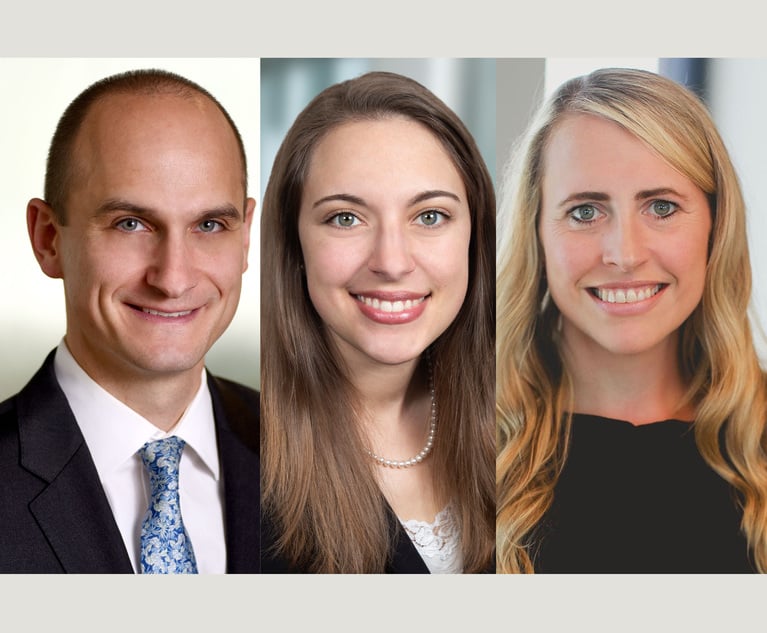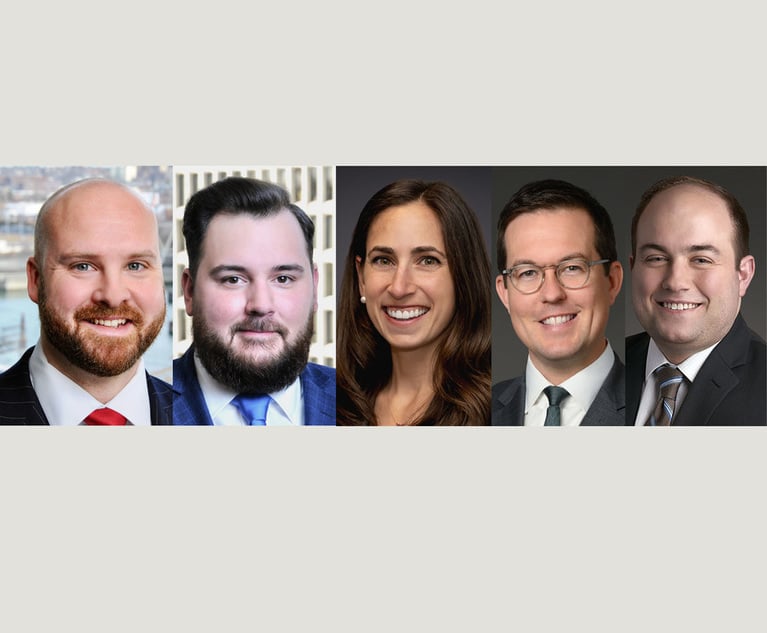Connecticut Lands In Center of Pot-Legalization Debate
U.S. Attorney Jeff Sessions' Jan. 4 decision to reverse Obama-era guidance on marijuana-related law enforcement has raised legal concerns in states across…
January 19, 2018 at 11:42 AM
5 minute read
 U.S. Attorney Jeff Sessions' Jan. 4 decision to reverse Obama-era guidance on marijuana-related law enforcement has raised legal concerns in states across the country and particularly in Connecticut, where medical cannabis is legal but legislators continue to assess their tolerance for decriminalizing recreational pot.
U.S. Attorney Jeff Sessions' Jan. 4 decision to reverse Obama-era guidance on marijuana-related law enforcement has raised legal concerns in states across the country and particularly in Connecticut, where medical cannabis is legal but legislators continue to assess their tolerance for decriminalizing recreational pot.
A factor that could place the Nutmeg State in the center of the national debate is the state's system of medical marijuana distribution, which entails a quasi-public network of growers and limited number of distribution centers that require growers, sellers and users to carry state-approved licenses and ID cards.
Bloomfield cannabis-advocacy attorney Aaron Romano is among those who say the U.S. Justice Department's “return to the rule of law” may only sound threatening to states like Oregon and Colorado, where legalized recreational marijuana has already been established, but could pose real problems for Connecticut and other states that are considering new policies.
“ It's kind of a rollback to where we were in the beginning,” Romano said of the Sessions memo putting states that have legalized marijuana back on notice. “But you have to compare the states in terms of how they've instituted their programs. If you compare Colorado to California, in Colorado the patient was given the right to grow plants, and a doctor would determine how many plants you can grow. In Connecticut we have four licensed growers and nine dispensaries, and patients are not allowed to grow.”
That means, Romano said, that “it would be very easy” for federal agents to come to Connecticut and shut down the state's entire system of growers and dispensaries in one day, since there is a limited number of them and their locations are known. Romano said he has opposed this system, which he called a monopoly from the beginning, largely due to its vulnerability to federal intervention.
“If a patient is given the right to grow, there aren't enough federal agents in Colorado to go out and bust everyone,” Romano said. “They can't be touched by the feds. In Connecticut, they know exactly where it is. The government has every incentive to come to Connecticut.”
State officials, meanwhile, have pushed back against the Sessions memo. While Gov. Dannel Malloy is opposed to fully legal recreational marijuana, he has supported and applauded the state's decriminalization of medical weed and possession of small amounts of cannabis. He told the Hartford Courant this week that the federal government “should take a leaf out of Connecticut's book,” citing the state's smarter marijuana policies as a factor in helping to reduce violent crime.
Connecticut Attorney General George Jepsen is one of 17 attorneys general who co-signed a letter asking the U.S. Congress to act on banking reforms that would remove barriers to businesses connected to the marijuana industry.
“We are a bipartisan group of state attorneys general who recognize that the states and federal government share a strong interest in protecting public safety and bringing grey market activities into the regulated banking sector,” they wrote. “To address these goals, we urge Congress to advance legislation that would allow states that have legalized medical or recreational use of marijuana to bring that commerce into the banking system.”
With legislative efforts in Connecticut currently stalled on the recreational side, 2018 may not be the year for major change, particularly with the state Legislature scheduled for a short legislative session. More than opposition, indecisiveness is often expressed. During a gubernatorial candidates forum hosted by the Connecticut chapter of the National Organization for the Reform of Marijuana Laws last November, Republican Prasad Srinivasan, a physician from Glastonbury, was the only candidate to speak against legalization, saying he was concerned police will have trouble determining levels of marijuana intoxication for motorists.
But Connecticut finds itself in the middle of a wave of legalization efforts in the Northeast, including next-door neighbor Massachusetts, where marijuana is legal but not yet permitted for commercial sale. Massachusetts Attorney General Maura Healey, criticizing the Sessions memo, said her federal counterpart “is inexplicably directing federal law enforcement resources away from combating the opioid epidemic to marijuana legalized by the people of Massachusetts.”
And in New York Tuesday, Gov. Andrew Cuomo announced his intention to fund a study on the potential impact of legalizing recreational marijuana in light of developments in nearby states. “New Jersey may legalize marijuana. Massachusetts already has. On the other hand, Attorney General Sessions says he's going to end marijuana in every state,” Cuomo noted. “If it was legalized in Jersey and it was legal in Massachusetts and the federal government allowed it to go ahead, what would that do to New York, because it's right in the middle?”
Additionally, nearby Vermont is set to become the ninth state in the country to legalize recreational cannabis Monday (and one of 30-plus to decriminalize it in one form or another), when Gov. Phil Scott signs a bill into law that would mark the first time a state has decriminalized recreational use through its legislature and not a ballot initiative.
Until such time that Connecticut follows suit, attorney Romano said he will continue to speak out, including in the form of a constitutional defense for a private client accused of possession in Middletown. “We are challenging Connecticut's prohibition law because of its racist origins, and the legislative history shows that.”
Romano added that he hopes public opinion will continue to lean toward favorability of cannabis decriminalization. “I think when it comes to cannabis, the stigma is just there, and it's inescapable. I think what people need to do is almost like a coming out day where professional, upstanding citizens come out and declare that they have smoked cannabis or currently smoke cannabis. They can make the declaration without fear of retribution, so people can see the stereotype of the pothead is inaccurate.”
This content has been archived. It is available through our partners, LexisNexis® and Bloomberg Law.
To view this content, please continue to their sites.
Not a Lexis Subscriber?
Subscribe Now
Not a Bloomberg Law Subscriber?
Subscribe Now
NOT FOR REPRINT
© 2025 ALM Global, LLC, All Rights Reserved. Request academic re-use from www.copyright.com. All other uses, submit a request to [email protected]. For more information visit Asset & Logo Licensing.
You Might Like
View All
Apple Disputes 'Efforts to Manufacture' Imaging Sensor Claims Against iPhone 15 Technology

New Partners at Cummings & Lockwood, Carmody Torrance Sandak & Hennessey
2 minute read

DOJ, 10 State AGs File Amended Antitrust Complaint Against RealPage and Big Landlords
4 minute readTrending Stories
- 1Many LA County Law Firms Remain Open, Mobilize to Support Affected Employees Amid Historic Firestorm
- 2Stevens & Lee Names New Delaware Shareholder
- 3U.S. Supreme Court Denies Trump Effort to Halt Sentencing
- 4From CLO to President: Kevin Boon Takes the Helm at Mysten Labs
- 5How Law Schools Fared on California's July 2024 Bar Exam
Who Got The Work
Michael G. Bongiorno, Andrew Scott Dulberg and Elizabeth E. Driscoll from Wilmer Cutler Pickering Hale and Dorr have stepped in to represent Symbotic Inc., an A.I.-enabled technology platform that focuses on increasing supply chain efficiency, and other defendants in a pending shareholder derivative lawsuit. The case, filed Oct. 2 in Massachusetts District Court by the Brown Law Firm on behalf of Stephen Austen, accuses certain officers and directors of misleading investors in regard to Symbotic's potential for margin growth by failing to disclose that the company was not equipped to timely deploy its systems or manage expenses through project delays. The case, assigned to U.S. District Judge Nathaniel M. Gorton, is 1:24-cv-12522, Austen v. Cohen et al.
Who Got The Work
Edmund Polubinski and Marie Killmond of Davis Polk & Wardwell have entered appearances for data platform software development company MongoDB and other defendants in a pending shareholder derivative lawsuit. The action, filed Oct. 7 in New York Southern District Court by the Brown Law Firm, accuses the company's directors and/or officers of falsely expressing confidence in the company’s restructuring of its sales incentive plan and downplaying the severity of decreases in its upfront commitments. The case is 1:24-cv-07594, Roy v. Ittycheria et al.
Who Got The Work
Amy O. Bruchs and Kurt F. Ellison of Michael Best & Friedrich have entered appearances for Epic Systems Corp. in a pending employment discrimination lawsuit. The suit was filed Sept. 7 in Wisconsin Western District Court by Levine Eisberner LLC and Siri & Glimstad on behalf of a project manager who claims that he was wrongfully terminated after applying for a religious exemption to the defendant's COVID-19 vaccine mandate. The case, assigned to U.S. Magistrate Judge Anita Marie Boor, is 3:24-cv-00630, Secker, Nathan v. Epic Systems Corporation.
Who Got The Work
David X. Sullivan, Thomas J. Finn and Gregory A. Hall from McCarter & English have entered appearances for Sunrun Installation Services in a pending civil rights lawsuit. The complaint was filed Sept. 4 in Connecticut District Court by attorney Robert M. Berke on behalf of former employee George Edward Steins, who was arrested and charged with employing an unregistered home improvement salesperson. The complaint alleges that had Sunrun informed the Connecticut Department of Consumer Protection that the plaintiff's employment had ended in 2017 and that he no longer held Sunrun's home improvement contractor license, he would not have been hit with charges, which were dismissed in May 2024. The case, assigned to U.S. District Judge Jeffrey A. Meyer, is 3:24-cv-01423, Steins v. Sunrun, Inc. et al.
Who Got The Work
Greenberg Traurig shareholder Joshua L. Raskin has entered an appearance for boohoo.com UK Ltd. in a pending patent infringement lawsuit. The suit, filed Sept. 3 in Texas Eastern District Court by Rozier Hardt McDonough on behalf of Alto Dynamics, asserts five patents related to an online shopping platform. The case, assigned to U.S. District Judge Rodney Gilstrap, is 2:24-cv-00719, Alto Dynamics, LLC v. boohoo.com UK Limited.
Featured Firms
Law Offices of Gary Martin Hays & Associates, P.C.
(470) 294-1674
Law Offices of Mark E. Salomone
(857) 444-6468
Smith & Hassler
(713) 739-1250










